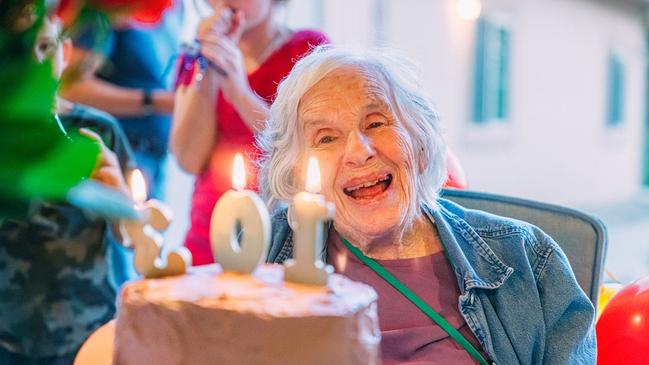The questions I want to ask Australians aged 100-plus
Today’s Australian centenarians are growing in net terms at a rate of roughly a thousand per year. There is something about this group that makes me curious.

They’re an elite group of Australians, officially estimated this year to number 7,544, who are living not so much among us but in specialist accommodation facilities with restful, soothing names. I am speaking of course of centenarians – Australians aged 100-plus.
By the late nineties there’s roughly a one-in-three chance of making it to the next year. To have won this lottery every year across the late nineties is both good fortune and good management by the community, the family and the centenarian.
By the age of 100 the working years have long since passed. Also long gone are concepts such as youth, life partners and probably even the idea of mobility and independence. Pride and self-respect come from different sources later in life: connection with a loving family is key. No amount of funds, however astutely accumulated and carried across a lifetime, can provide what I suspect delivers the greatest return on investment in life’s later years. And that is the respect, the love and the fun of being part of a happy family.
Sadly, not all centenarians – or indeed nonagenarians or octogenarians – are this fortunate. Loneliness is the scourge of the super aged. This can be brought about by distance and/or by family breakdown.
Today’s Australian centenarians are growing in net terms at a rate of roughly a thousand per year. Not so much because of rising birth rates a hundred years ago but because as a society we are healthier and better cared for. Official estimates put Australia’s centenarian population at more than 60,000 by 2071. So whatever cost, care and labour we are allocating now to centenarians must be upped nine-fold in the next half-century. And while technological wizardry might be revolutionising the retail, banking and travel industries, it is hard to see even the cleverest of robots employed in aged care.

Have you ever seen an aged care worker gently, lovingly, help an incapacitated older person perform even the most basic of tasks? And all the while offering soothing, kind words. It is one of the purest, most caring of human acts, I think. Dignity and comfort preserved and provided. How exquisite.
But there’s something about the three-digit achievement that makes me curious. What is it that those on the far edge of life think about? What times, what experiences, what joys and sorrows are carried forward? Does a 100-year-old remember in excruciating detail the pain of being bullied at school, or the joy of first love? What matters in life to the extent that it is carried as the sweetest of joys or as the heaviest of burdens across the decades of life?
Here is a rich resource of several thousand Australians, some of whom – perhaps even many of whom – might be sufficiently lucid, articulate and willing to tell the double-digit world their thoughts about the meaning of life. This is important because, to date, we’ve largely heard from influencers and others who happily deliver social and other commentary from the hardly unique vantage points of youth, middle age and beyond.
Perhaps in the interests of diversity we could hear more from those who have actually experienced the whole of life.






To join the conversation, please log in. Don't have an account? Register
Join the conversation, you are commenting as Logout